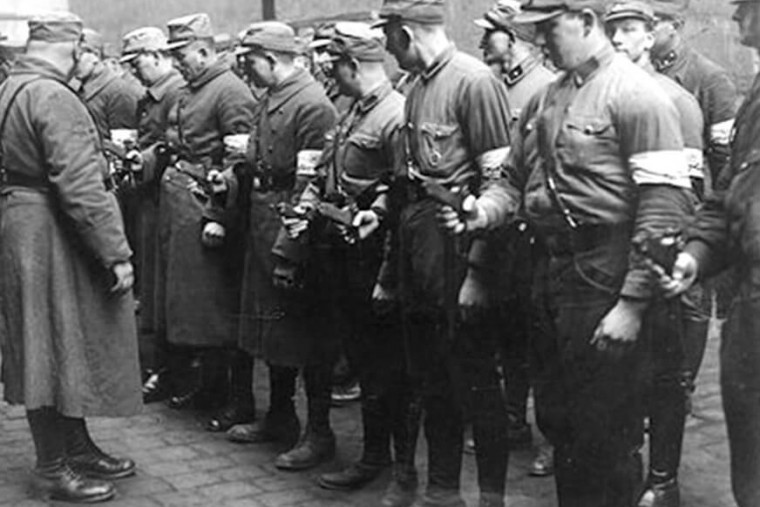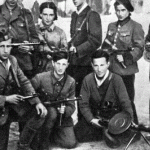
At Breitbart, John Nolte notices that David Frum is trying to school Ben Carson on “gun control.” (The correct expression for the concept intended is gun restrictions, so I will use that here.)
What Nolte calls out is Frum’s remarkable assertion that a gun-restriction policy in Germany could have prevented the Holocaust.
Hold back the laughter for a moment. You’re going to want the information below, so please follow along with me. I promise, this is better than a meme image with a questionable “quote” from Hitler.
First, Frum really did suggest that Hitler could have been stopped with a little creative gun restriction. Nolte has the quote, from a Frum article at The Atlantic posted on 10 October:
There’s really only one way in which gun control is at all relevant to the history of the Holocaust. As the late historian Henry Turner forcefully argued in Hitler’s Thirty Days to Power, the last clear chance to prevent the Nazi seizure of power in 1933 would have been a military coup at the end of 1932, followed by mass arrests of members of Nazi and communist militias, and the confiscation of their weapons. You might even say that stricter control of guns and gun-carrying political groups could have prevented the Holocaust.
So: if only the German authorities had had “stricter control of guns and gun-carrying political groups,” the whole Third Reich escapade might have been averted.
How strict should “stricter” have been? That’s a good question. Because Germany, in the pre-Hitler guise of the Weimar Republic, had newly strict “gun control” laws.
Why did it adopt them, in the period 1928-31? Because of the Nazis (National Socialists) and the German Communists, who had a bad habit of fighting each other in the streets.
What did the laws do? Order everyone in Germany to register his guns. The Weimar Republic also enacted a gun law in 1928 that allowed the authorities to deny guns to “unreliable” persons.
The history of the gun restrictions that softened Germany up for the Nazi regime is recounted in an indispensable study by attorney Stephen P. Halbrook, Gun Control in the Third Reich, published in 2014 by the Independent Institute. (Amazon link here.)
Herbert W. Stupp wrote an excellent review of the study for The American Spectator, and I will quote from it here:
We learn from [Halbrook] that extensive gun registration and controls were actually implemented by liberal Weimar Republic leaders in the late 1920s. In those days, Berlin and other German cities were repeatedly rocked by violent street battles between Communist and Nazi thugs, with police often bearing the brunt of the confrontations. For example, during Communist-led confrontations in Berlin, one Erich Mielke murdered two police captains, earning his Communist “street cred,” while cavalierly creating orphans. Mielke escaped prosecution by making his way to the Soviet Union, where he remained until the Nazi defeat in 1945.
The thought process of Weimar officialdom has an eerily familiar ring today (all emphasis added):
In 1931, the Berlin police recorded the murders of 47 members of the Nazi Brownshirts (SA), and 80 members of the Communist Rotfront (Red Front), mostly in street battles with each other. In this sort of environment, German liberals of the day were hoping that gun registration and controls would restrain the violence racking their urban centers. In a lesson for future jurisdictions considering new restrictions on private ownership of firearms, it became obvious that neither the Nazis nor the Communists registered or turned in their weapons. Ordinary, law-abiding Germans did register their legally owned guns. But they were no threat to public tranquility.
The 1928 law denying guns to “unreliable” persons became a precursor to the infamous Nuremberg Laws, one of whose provisions prohibited Jews from owning firearms. And Jews weren’t the only people prohibited from owning guns.
The Weimar gun control law of 1928 allowed police to deny firearms ownership to any “unreliable” person. The Nazis seized on this language, eventually making unauthorized ownership of guns and other weapons a very serious crime. …
On November 10, 1938, the Nazi Interior Department formally decreed that persons defined as Jews under the infamous Nuremberg Laws were prohibited from possessing any types of weapons. They declared that Jews possessing weapons would be subject to 20-year sentences in concentration camps. In the nations and territories invaded and occupied on Hitler’s orders, private gun ownership was punishable by death.
It’s not that hard for the state to start designating people as “unreliable” for political purposes, once the door is opened by a “common sense” law.
Finally, Halbrook documented the Nazi regime’s master stroke: registering the entire population of Germany, with religious affiliation indicated – a process automated with an early use of computing – and cross-referencing the database with the national gun registry.
Once the gun laws had been “tightened,” this meant more than that Jews could be disarmed. It meant that Jews and other “unreliable” persons, who had obediently registered their guns as much as 10 or 12 years earlier, could be charged with illegal possession of firearms, and punished severely under the “tightened” laws.

The bottom line? Ben Carson is right, and David Frum is wrong. Germany did have strict “gun control” laws, even before Hitler came to power. The laws were made for precisely the reason Frum suggests. But the laws didn’t work to stop Hitler.
Instead, they created the precedent and the conditions for Hitler to “tighten” those very laws, and use them to disarm and punish whomever he wanted to; i.e., Jews, and his political enemies. The myth of “gun control” – the myth that it is a form of “control” that can be exercised for the public good – was deeply complicit in enabling the Holocaust.
Ironically, the title of Frum’s piece is “From Guns to Migrants: Not Everything Is like the Holocaust.”
Frum suggests in his opening sentences that we all stop invoking the Holocaust as a comparison for everything. And I couldn’t agree more. But where the comparison makes a valid point, I am most certainly going to invoke it – and I laud Ben Carson for doing so.
by J.E. Dyer



